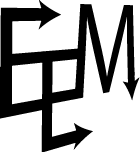This might sound like even more of a subjective stretch than usual. In terms of this being a scratch pad for thoughts and interests that spring up while doing book research, this one is maybe equal parts past and present. Whatever the tab, I ducked back down an unlit alley this morning. So goes the world when no editors are involved. Or metaphorical electronic dog collars to get me back within the proper mental fencing.
Back on the barely Google-able, leading edge of this century, I was doing some freelancing and had an assignment from a fresh web-based money/business newsy site. "Green Magazine" was pretty cool in its day. Now that URL is used by John Deere enthusiasts...where a certain cut of folk can find some serious ag and machinery loving kinks. Nonetheless, way back yonder I tried to work an angle on explaining "offshore bank accounts" as a tax shield. I soon realized I'd swung way too broadly and the idea never came together. I do remember one especially greasy interview with a financial planner - the sort where you want to take a brain shower afterwards - who loosely framed how people from all walks of life could set up a foreign company or open offshore accounts with little more than the will to do so. The devil - as the cliche` goes and he often is - was in the details.
Over the years I've often come back around to that subject. Not actually doing anything to better understand the idea of parking money offshore or setting up the means to launder it. Just thinking when the subject came up that an operational story would be a good idea. Was it hard to head down this road? Could truly anyone venture offshore with their money? Thankfully, there are some pros who are pursuing parts of that broad story right now. "Planet Money" (National Public Radio's economics and business podcast) just posted the latest installment in their series on setting up "shell companies" - they chose Belize and Delaware (yes, that Delaware). The "Planet Money" folks are describing how people might move money places in hopes of avoiding taxation. Not really a "how to" even though that's certainly part of it. I think it's more of a "what if you did" story. And a darn good one, at that. The style is incontrovertibly NPR-ish - quirky, willing to slow walk a story that might tucker out before it's run the whole course, genius as a concept and really well-executed, self-deprecating while being eviscerating. I really recommend that you check it out.
Back on the barely Google-able, leading edge of this century, I was doing some freelancing and had an assignment from a fresh web-based money/business newsy site. "Green Magazine" was pretty cool in its day. Now that URL is used by John Deere enthusiasts...where a certain cut of folk can find some serious ag and machinery loving kinks. Nonetheless, way back yonder I tried to work an angle on explaining "offshore bank accounts" as a tax shield. I soon realized I'd swung way too broadly and the idea never came together. I do remember one especially greasy interview with a financial planner - the sort where you want to take a brain shower afterwards - who loosely framed how people from all walks of life could set up a foreign company or open offshore accounts with little more than the will to do so. The devil - as the cliche` goes and he often is - was in the details.
Over the years I've often come back around to that subject. Not actually doing anything to better understand the idea of parking money offshore or setting up the means to launder it. Just thinking when the subject came up that an operational story would be a good idea. Was it hard to head down this road? Could truly anyone venture offshore with their money? Thankfully, there are some pros who are pursuing parts of that broad story right now. "Planet Money" (National Public Radio's economics and business podcast) just posted the latest installment in their series on setting up "shell companies" - they chose Belize and Delaware (yes, that Delaware). The "Planet Money" folks are describing how people might move money places in hopes of avoiding taxation. Not really a "how to" even though that's certainly part of it. I think it's more of a "what if you did" story. And a darn good one, at that. The style is incontrovertibly NPR-ish - quirky, willing to slow walk a story that might tucker out before it's run the whole course, genius as a concept and really well-executed, self-deprecating while being eviscerating. I really recommend that you check it out.
